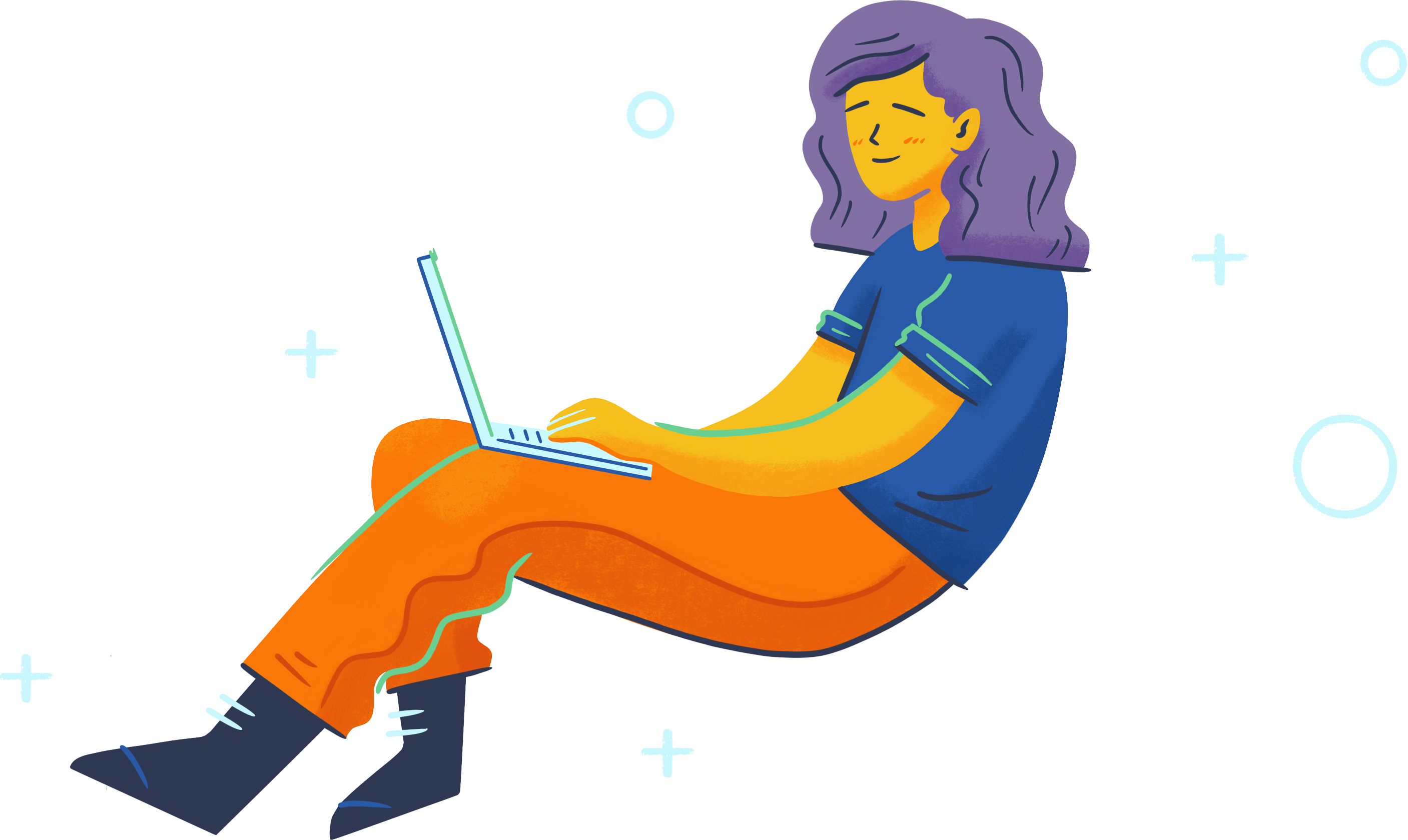100k Treehouse points & counting: Jennifer coding story
A few months ago, Treehouse student and moderator, Jennifer Nordell, caught our eye in the Treehouse Community. Not only had she worked her way through a phenomenal number of courses, she was also an incredibly active and valuable member of the Community, answering hundreds of student questions in a diverse range of topics. Although she’d been a student for less than a year, Jennifer had already racked up thousands of points on her Treehouse profile (she’s reached over 100k now). We were so impressed by Jennifer’s progress that we asked to virtually meet her to hear more about her story and her incredible drive to learn.
After spending time with Jennifer, it came to light that she isn’t just an impressive student, she’s also an inspirational individual with a unique backstory that ties to her coding. In recent years, Jennifer has lived with a disability that restricts her from being able to work a regular 9-5 job. As a result, Jennifer searched for other outlets for her time. Coding is something that comes naturally to Jennifer and is something she enjoys, so using her free time to expand her coding skills and helping others progress became a valuable focus.
We asked Jennifer if we could share her experience becoming a developer with the community.
Are you ready to start learning?
Learning with Treehouse for only 30 minutes a day can teach you the skills needed to land the job that you've been dreaming about.
Start A Free TrialWhat first encouraged you to learn to code?
When I was about 10 years old, my father won a Commodore Vic 20 in a raffle. At the time, the idea of a computer in every household was ridiculous. My mother considered touch typing to be the most valuable skill a woman could have, so she encouraged me to type the instruction manual to that Vic 20 over and over. It was one of the conditions of me being allowed to have it out and hooked up to the television. At the back of that manual were several chapters on the BASIC programming language, and those were my favorites.
Many years later (with only some brief dabbling in programming here and there), I got started on freeCodeCamp just to see what programming was like these days. I then saw Treehouse mentioned briefly in one of the chat channels. I visited Treehouse for the first time the following day and loved what I found there. That was February 1, 2016. I’ve been learning to program with Treehouse ever since.
How do you integrate learning to code into your everyday life?
That’s a great question and the answer has changed with time. In the beginning, it was sort of random how much or how long I’d put into learning to code. I tried to keep to a strict regimen of at least meeting the recommended daily steps set by Treehouse, but the more I learned, the more motivated I was to learn more. It has since become part of my everyday life.
Learning to code isn’t something I perceive as a chore or something I must schedule, rather it has become somewhat of a form of entertainment for me. I do it when I’m healthy, not overly tired, and want something more challenging than watching television. I spend a few minutes or even sometimes a few hours watching and learning. It’s as natural for me to sit and code for fun as it is for others to sit and watch Netflix.
It’s as natural for me to sit and code for fun as it is for others to sit and watch Netflix.
What has the value of a Treehouse education meant to you?
It has very simply given me a new skill set and one that is not particularly common out in the general population (more rarely among women). While I might never be able to work a full-time job, I am on the road to obtaining a passive income that might very well make my life more comfortable, and I’m having a great time doing it! It also means that I’m less likely to listen to people who say that I must be stupid just because of my disability. I have at least some objective proof that disputes those claims.
You’re an active and valuable member of the Treehouse Community. Tell us a bit about your experience getting involved and being part of the community.
A couple of weeks after I started Treehouse, I began receiving emails from Treehouse saying, “You’ve made great progress with…”. My initial thought was: “I have?”. This email suggested that I go out onto the boards and try to help answer questions in the Community. I was terrified to even try and considered myself not qualified to answer any question at all. So, the very first email, I ignored completely.
The very next week I got another. This time Treehouse had tacked JavaScript onto the end of that list. I thought, “Ok, I can at least see if there might be some simple question I can answer”, but when I opened the Community boards that day, the only unanswered question on the first page was a Java question. I’d had some experience with Java from my dabbling before, but not much. However, I was curious as to what the Java challenges looked like, so I opened the question and found the challenge linked. As it so happened, I immediately saw the error.
It was simply a missing semicolon that was causing the compiler error, so I answered the question for the student. This would be my first interaction with a Treehouse moderator. Suddenly, answering questions for other students in the Community became somewhat of an addiction. There is nothing to test your knowledge quite like having to explain something to another person. I even began taking more courses and learning more languages just so I could answer more questions. I had no idea moderators and possibly even staff were watching me on the forums. People began to reach out to me through Twitter and other social media about my activity on Treehouse. I now belong to a couple of Slack teams with people I met from there. I have legitimately made friends that I will likely consider friends for life because I was active on the Treehouse Community. To date, I’ve answered over 2,500 questions on the forums and have over 1,100 best answers.
There is nothing to test your knowledge quite like having to explain something to another person. I even began taking more courses and learning more languages just so I could answer more questions.
What do you think is the most valuable programming language to learn at the moment and why?
This is as individual as your favorite flavor of ice cream. The true answer is: “The one that will produce the desired results.” You might be looking to get a full-time job as a developer with a big company. If you live in a town where there’s a big Java programming boot camp, it’s possible that the market is being flooded with Java developers and you might be better served to pick another. It’s important to consider what’s in demand in your area.
If you’re looking to be an indie developer and work on your own projects, then choose what you love. Choose the platform that motivates you. If you love Apple products and want to develop for them, then choose Objective-C and Swift. If you love Android, then choose Java. The goal for this type of developer is the finished product on the platform of their choosing. My best advice is to do your research and first decide on an idea and then the platform.
What most excites you about the future of the tech industry?
The things that excite me most about the future of the tech industry are things I can’t even imagine yet. Forty years ago, we never dreamed that most houses would have personal computers. Twenty years ago, we never even imagined that most web browsing would be done on a telephone that you kept in your pocket. It’s the things I can’t even imagine and sound like science fiction that are going to be amazing.
“Detail-oriented” is an understatement regarding what you need to be when coding. A single space, misspelled word, or misplaced punctuation mark can break your code. If you weren’t detail-oriented before, you will be.
Is there anything you wish you’d known when you started learning to code?
Here are some things I wish I knew before I started coding:
- Programmers, in general, are not a bunch of elitist snobs. I’ve yet to meet anyone who wants to see me fail. What I encounter repeatedly are people who actively want me to succeed.
- Self-confidence is a giant hurdle. The “imposter syndrome” is very common and hard to overcome.
- “Detail-oriented” is an understatement when it comes to coding. A single space, misspelled word, or misplaced punctuation mark can break your code. If you weren’t detail-oriented before, you will be.
- It’s the concepts and big ideas that matter most. The details of the implementation and syntax will come with practice.
- Problem-solving is your most mission critical skill.
- While a good foundation in basic math is important, it’s comforting to know that the really heavy-lifting regarding math is done by the computer.
Problem-solving is your most mission critical skill.
What are your plans for the future when it comes to coding?
Right now, my plans are to continue along with my Techdegree and see where it takes me. Unlike many, I’m unable to work a full-time job because of my disability so my motivations might be slightly different than the average student.
Ideally, I’d like to have some apps on the App Store (and possibly even Google Play later), and I do have some app ideas! I want to see at least a few of them become a reality. Hopefully, I’ll be able to make some passive income that way. Anything that would make my everyday living situation be more comfortable would be nice, but having that happen while doing something I love doing would be nothing short of amazing!

Are you ready to start learning?
Learning with Treehouse for only 30 minutes a day can teach you the skills needed to land the job that you've been dreaming about.
Start A Free Trial
